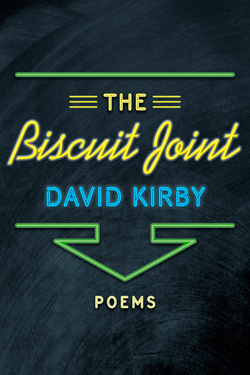The Biscuit Joint: Poems
by David Kirby
reviewed by Joelle Biele
If Acura ever decides to get a new host for “Comedians in Cars Getting Coffee” or if Nike, say, wants to start its own series, “Poets in Sneakers Getting Jamba Juice,” David Kirby would be their man. Billy Collins, Denise Duhamel, and Campbell McGrath could all be guests, and if time travel were a possibility, Kirby could discuss candy and fleas with Ogden Nash and the nuances of “scalawag,” “mendacity,” and “meringue” with Marianne Moore. I know I’d watch.
Kirby, who is a distinguished professor at Florida State University, is the author of some two dozen books, The Biscuit Joint being the latest. Kirby has also written critical studies, scads of book reviews—some of which appear in his essay collections—as well as children’s books and a biography of Little Richard, which is also part memoir about growing up in the post-war South. Having assembled literary dictionaries and bibliographies, edited collections of scholarly essays, and, with his wife, poet Barbara Hamby, put together that recent gem of an anthology, Seriously Funny, he’s an indefatigable champion of writers, books, and the people who study them. Kirby’s got range.
A performer at heart, Kirby’s gift is the free-wheeling, comic monologue. In poems of some hundred-or-so lines that are often just a couple of sentences, Kirby writes in jagged stanzas that make use of the white space for suspense and breath. He mixes references to the canon with details about life in Tallahassee. Plato, Gauguin, and Cymbeline all make an appearance as do an 89-cent cup of coffee, “Tutti Frutti,” and a bag of chips. His language offers the same bright concoction with “dithyrambs” and “fakey,” “I HEART Hot Moms” and “pestilential.” Kirby has often said that he values poetry that entertains, that reaches a wide audience. He shares his enthusiasms high and low without showing off. Of course everyone talks about Turandot on Facebook as if they were exchanging vacation tips. Play with the unexpected is a large part of Kirby’s charm. His beast from Revelations comes out of King James and hip-hop. As he says in “Backwards Man”: “I’m the poet of circuses // but also art galleries and snacks. Really, though, I’d like to be / the poet of kindness and learning. Oh, / and kisses! And encounters, of course—chance encounters.”
Underneath much of the clowning about sex and various body parts, many of Kirby’s poems express anxiety about the role of the artist and the place of art in society. He gets right to it in the book’s first poem, “Why I Don’t Drink Before Poetry Readings.” Moving from the general to the particular in one swooping sentence, the reading in question is at the speaker’s own university, where he has to balance his own needs as a writer while looking at a dean attempting to woo potential donors, another official hoping to smooth town-gown relations, women who want him to inspire them with the very best of Western thought, and a little girl who can’t decide if he’s a priest or singer hired for children’s parties. Who wouldn’t need a drink? Kirby wants to reach those readers, but on his own terms. In another poem he literally invites everyone who has died since he was born to his house so they can talk poems, especially Walt Whitman’s. He knows that they’re probably not that interested. No matter; he’s still going to try: “Come on / in, Grandma! You can sit next to Federico García Lorca.”
When Kirby lets the terror in, nothing can stop him. It’s what made his book The House on Boulevard Street, and in particular his poem “Baby Combover,” such a hit. The speaker in “Siberia” looks out his train window and begins to think about the Russian writer Varlam Shalamov, who was sent twice to the gulag for a total of thirteen years, Shalamov’s story about Osip Mandelstam’s last hours, and the fear poetry instills in those in power. Kirby writes:
I’m not afraid of you, poetry,
therefore I must not be powerful.
But you are. Poetry for president! Tippecanoe
and poetry, too. United we stand, divided
we write poetry. Poetry’s got my back!
[…]
Why aren’t we all poets? Why aren’t we all in jail.
The richness of this ending—its devastating range of tones—is part of what makes Kirby a poet of shared humanity. His antics on the page (in this poem its orgies) are anything but. His poetry embraces subjects, words, and readers of all types in a blaze of ebullience and humility.
Published on October 22, 2013

